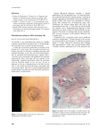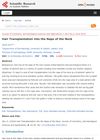 75 citations,
October 1996 in “Dermatologic Clinics”
75 citations,
October 1996 in “Dermatologic Clinics” Chronic Telogen Effluvium is a hair loss condition in middle-aged women that usually doesn't lead to complete baldness.
 74 citations,
July 2010 in “The Journal of Clinical Endocrinology & Metabolism”
74 citations,
July 2010 in “The Journal of Clinical Endocrinology & Metabolism” Treatment of acromegaly can improve women's reproductive health issues caused by hormonal imbalances or tumors.
 72 citations,
December 2012 in “Expert Opinion on Drug Delivery”
72 citations,
December 2012 in “Expert Opinion on Drug Delivery” Niosomes are promising for skin drug delivery, offering benefits like improved drug penetration and stability.
 49 citations,
February 2019 in “The Journal of Clinical Endocrinology and Metabolism”
49 citations,
February 2019 in “The Journal of Clinical Endocrinology and Metabolism” Use "female pattern hair loss" term, assess androgen excess, treat with minoxidil and other medications if needed.
 38 citations,
October 2006 in “Fertility and Sterility”
38 citations,
October 2006 in “Fertility and Sterility” The document concludes that identifying the cause of amenorrhea is crucial for proper treatment.
 35 citations,
January 2014 in “Postepy Dermatologii I Alergologii”
35 citations,
January 2014 in “Postepy Dermatologii I Alergologii” DHT's role in hair loss is important, but measuring its level for diagnosis is questionable.
 30 citations,
July 2004 in “Fertility and Sterility”
30 citations,
July 2004 in “Fertility and Sterility” Amenorrhea is when a woman doesn't have periods, with primary amenorrhea starting by age 15 or within five years of breast development, and secondary amenorrhea when periods stop for three months. It affects 3-4% of women not pregnant, breastfeeding, or in menopause, mainly due to polycystic ovary syndrome, hypothalamic amenorrhea, hyperprolactinemia, and ovarian failure.
 21 citations,
March 2019 in “Journal of The American Academy of Dermatology”
21 citations,
March 2019 in “Journal of The American Academy of Dermatology” The review highlights the need for more research on transgender dermatology, the role of dermatologists in gender affirmation, and the effects of hormone therapy on skin and hair.
 13 citations,
October 2011 in “Clinical Obstetrics and Gynecology”
13 citations,
October 2011 in “Clinical Obstetrics and Gynecology” Women with PCOS-related infertility can often conceive with treatments like clomiphene and metformin, but managing pregnancy complications is important.
 13 citations,
February 2006 in “Clinical and Experimental Dermatology”
13 citations,
February 2006 in “Clinical and Experimental Dermatology” A benign tumor developed at a girl's BCG vaccination site, not previously linked to the vaccine.
 12 citations,
May 1989 in “Postgraduate Medicine”
12 citations,
May 1989 in “Postgraduate Medicine” The document concludes that hair loss is common and can be treated with medications like minoxidil or surgical options, and it significantly affects people's psychological well-being.
 8 citations,
May 1996 in “Endocrinology”
8 citations,
May 1996 in “Endocrinology” Certain adrenal hormones can strongly stimulate oil gland growth in hamster skin, similar to male hormones.
 5 citations,
May 2021 in “BMC surgery”
5 citations,
May 2021 in “BMC surgery” A man's unusual scalp folds caused by a skin condition were treated with surgery and remained unchanged two years later.
 4 citations,
October 2007 in “Dermatologic Clinics”
4 citations,
October 2007 in “Dermatologic Clinics” Glucocorticoids and sex hormones affect skin health, with potential for targeted treatments to minimize side effects and treat skin conditions.
 4 citations,
January 1974 in “The BMJ”
4 citations,
January 1974 in “The BMJ” All medications can cause skin rashes, often without a clear cause, and better tests are needed to identify these drug-related skin issues.
 3 citations,
January 2012 in “Elsevier eBooks”
3 citations,
January 2012 in “Elsevier eBooks” The document says that there are treatments for hair and nail diseases.
 1 citations,
October 2008 in “Expert Review of Dermatology”
1 citations,
October 2008 in “Expert Review of Dermatology” Frontal Fibrosing Alopecia is a slowly progressing hair loss condition, likely underdiagnosed, with ineffective treatments, needing more research to understand it fully.
 August 2023 in “International Journal For Multidisciplinary Research”
August 2023 in “International Journal For Multidisciplinary Research” Ayurvedic treatment, exercise, and a healthy diet can effectively manage PCOD symptoms.

Any medication can cause skin reactions, some due to allergies and others due to dosage or genetic factors.
 February 2014 in “Medicine - Programa De Formación Médica Continuada Acreditado”
February 2014 in “Medicine - Programa De Formación Médica Continuada Acreditado” The document concludes that non-scarring alopecias can be reversed, but scarring alopecias cause permanent hair loss.
 December 2004 in “Medicine”
December 2004 in “Medicine” A thorough history and examination are crucial for diagnosing skin diseases, which affect up to a third of people. This includes details about skin lesions, medication, general health, lifestyle, family, and contacts, as well as examining the rash, hair, nails, and mucous membranes. Changes in hair and nails can also indicate other medical and skin disorders.
 October 1961 in “Archives of Dermatology”
October 1961 in “Archives of Dermatology” Reassurance is important for postpartum hair shedding as it likely won't cause complete baldness.
 257 citations,
July 2018 in “Obstetrics & Gynecology”
257 citations,
July 2018 in “Obstetrics & Gynecology” PCOS is a complex disorder in women that can lead to various health risks and requires personalized treatment.
 66 citations,
January 2001 in “Vitamins and hormones”
66 citations,
January 2001 in “Vitamins and hormones” Androgen receptors are key for development and health, affecting conditions like prostate cancer and male pattern baldness.
 11 citations,
May 2009 in “Medical Hypotheses”
11 citations,
May 2009 in “Medical Hypotheses” Male pattern baldness is an unintended side effect of the body's use of androgens for muscle growth, especially in those genetically prone to it.
 1 citations,
June 2013 in “Medicine”
1 citations,
June 2013 in “Medicine” A thorough skin history and full examination are important for diagnosing and understanding the impact of skin diseases.

A thorough skin history and examination are essential for diagnosing and treating skin conditions effectively.
1 citations,
March 2012 in “Journal of pediatric & adolescent gynecology” A young girl with high testosterone was thought to have a tumor but actually had PCOS, which was treated with birth control pills.
 January 2018 in “Journal of Cosmetics, Dermatological Sciences and Applications”
January 2018 in “Journal of Cosmetics, Dermatological Sciences and Applications” Hair transplant surgery can successfully treat hair loss at the back of the neck.
8 citations,
September 2005 in “Practical diabetes” PCOS is a condition causing irregular periods, excess male hormones, and infertility, often managed by targeting insulin resistance and specific symptoms.




























